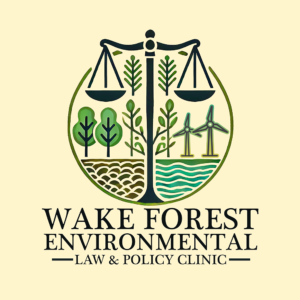Environmental Law & Policy Clinic
Overview
Wake Forest Law’s Environmental Law and Policy Clinic creates opportunities for students to help advance the goals and defend the interests of local, state, national, and international clients. These opportunities encourage a solution-focused approach to environmental concerns. This means student practice looking at problems and issues from all sides while also prioritizing the goals and needs of their clients.
The Environmental Law and Policy Clinic is primarily a teaching opportunity that also benefits those otherwise unable to afford or access environmental representation. This clinic focuses predominantly on matters that are local to northwestern North Carolina or are otherwise international in scope. Students work collectively as a law firm so that they learn from the experience of their peers as well as their individual clients.
The Course
Studying and practicing environmental law and policy is an excellent opportunity to hone skills that cut across economics, social issues, scientific uncertainty, and environmental imperatives. From researching and writing to strategizing, arguing, and counseling, environmental practice allows law students to learn how to be well-rounded lawyers and to work with people in various disciplines.
The Environmental Law and Policy Clinic is offered each semester. It is only open to second and third year Wake Forest Law School students.
It is a four-credit course that requires students to spend 10-12 hours per week on clinic and course work. Class time is spent focusing on professional responsibility, legal basics, and learning the tools available to lawyers. Practitioners and clients will occasionally attend class to provide insights into working with scientists, advocates, companies, and government officials.

Clinic Director

Scott Schang
Matters
The Environmental Law and Policy Clinic takes on predominantly non-litigation matters for clients who are otherwise unable to afford or access legal representation on matters relating to environmental and sustainability issues.
The clinic seeks a diverse set of matters to give students a fulsome exposure to the variety of issues that arise in legal practice. Each student will work on both an heirs’ property matter, as described here, and an environmental policy matter such as:
- Amicus briefs for experts to international human rights bodies for climate change harms
- Model laws to protect environmental and land defenders
- Environmental justice policies in North Carolina
- Siting and environmental impacts of poultry farms
- Erosion of local homeowners’ property after increased development
- Volatilization of lead during house and structure fires and resultant contamination
- Causes and effects of property insecurity in Forsyth County
- Management of historic land contamination at a local school
- Best practices in land use and land management around the globe
Clients include international organizations, national think-tanks, state environmental coalitions, regional and local non-profit organizations, local schools, county governments, among others.
Heirs’ Property Project
Wake Forest Law’s Environmental Law & Policy Clinic works with grassroots organizations across the state to provide and increase access to direct legal service for predominantly minority and low-income families at risk of losing their ancestral lands and homes. The Heirs’ Property Project is one of only a handful of law school clinics providing these direct legal services.